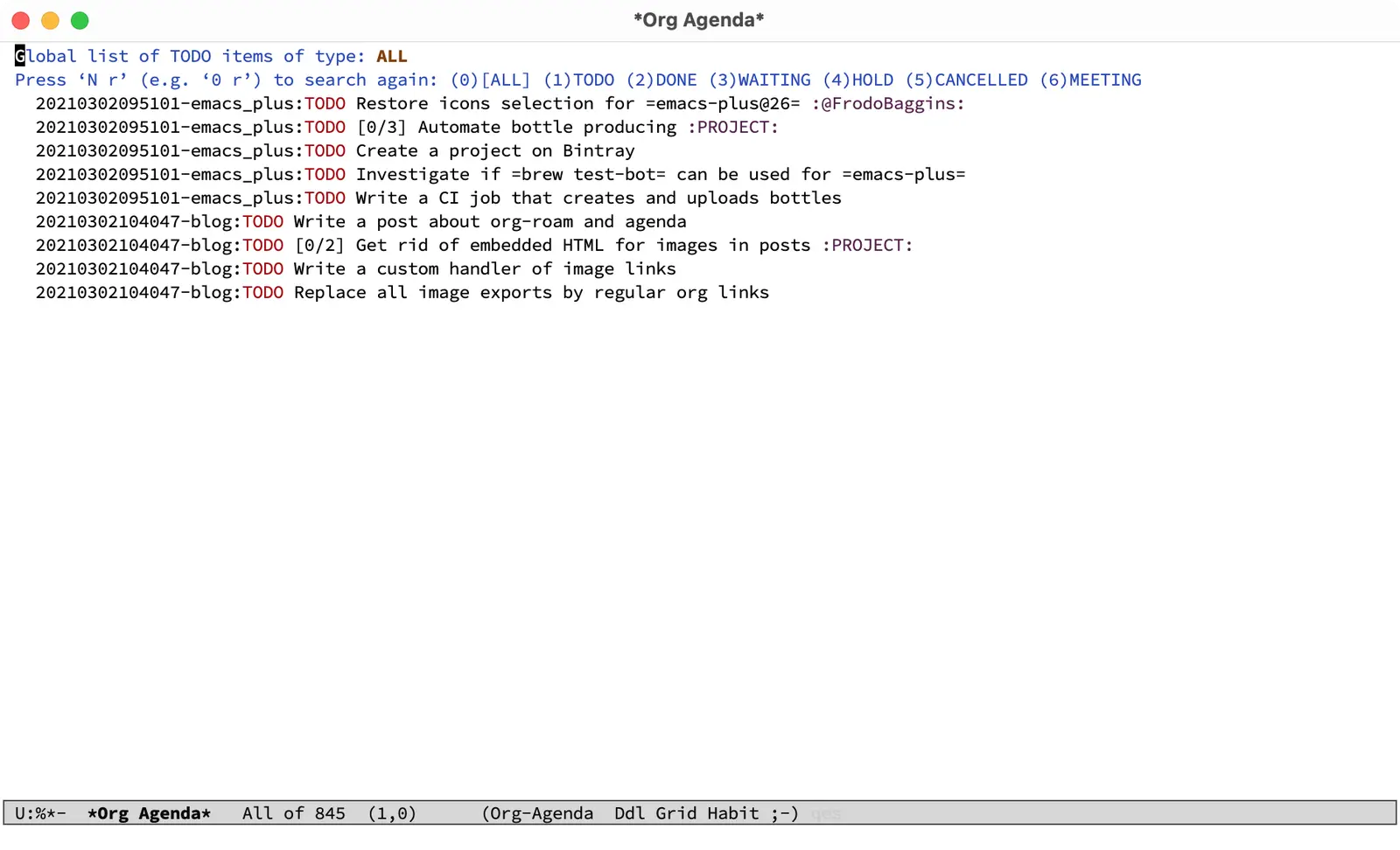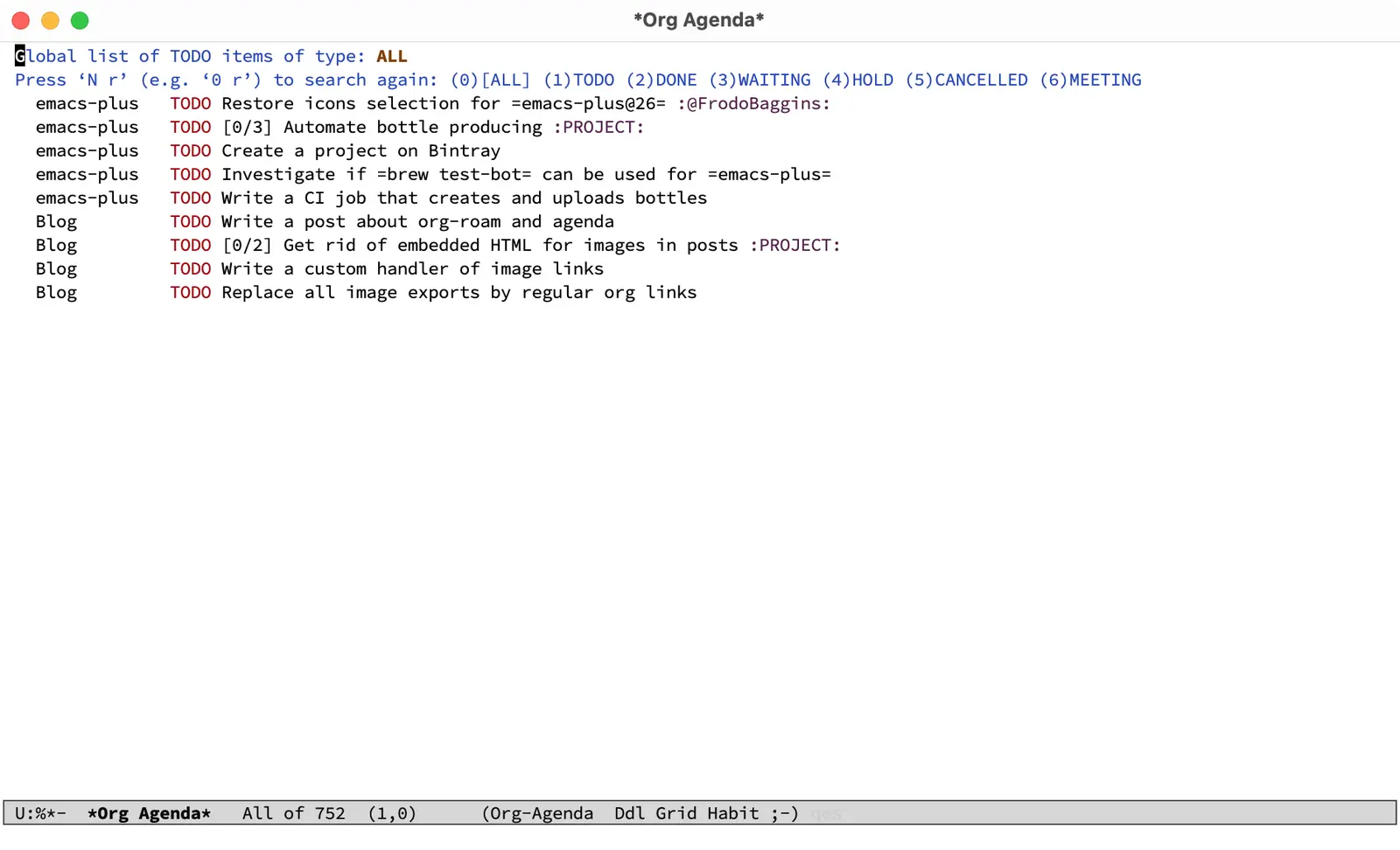Task management with org-roam Vol. 2: Categories
Fixing category display in org-roam agenda views by showing meaningful categories based on note titles instead of file IDs, with automatic extraction and formatting for clean, readable results.
In the previous article, we set the groundwork for moving tasks to org-roam and encountered an issue with visual clutter in the agenda buffer - namely, the org-roam file ID appearing as part of the category. In this article, we're going to explore ways to overcome this issue.


Change Log
- [2025-11]: This series was written for vulpea v1 with org-roam. See Vulpea v2: breaking up with org-roam for context on vulpea v2, which no longer depends on org-roam. Updated guides are coming.
- [2021-03-02]: Updated category extraction function to use
TITLEof the note and enforce length limit. Kudos to Tim Ruffing for the idea. - [2021-03-02]: Updated naming convention to match personal configurations.
- [2021-05-10]: Updated post to reflect changes in org-roam v2. Previous version of this article is available on GitHub.
Related posts
One of the simplest solutions is to mimic the approach used for headlines by setting the CATEGORY property at the file level (manually or using org-set-property).
:PROPERTIES: :CATEGORY: emacs-plus :END: #+title: emacs-plus ...
:PROPERTIES: :CATEGORY: blog :END: #+title: Blog ...

While this works, it is a manual labor. And in most cases we want to use TITLE as CATEGORY, at least for agenda buffer. Fortunately, we can help agenda to properly parse the category by modifying the value of org-agenda-prefix-format, which allows to specify how to render each line in the different agenda buffers (e.g. regular agenda, in the list of todo tasks etc). We are looking for the capability to evaluate arbitrary lisp expressions. The default value of this variable is
((agenda . " %i %-12:c%?-12t% s") (todo . " %i %-12:c") (tags . " %i %-12:c") (search . " %i %-12:c"))
The interesting part is %-12:c which means:
- Give the category (because of
c) a 12 chars wide field, padded with whitespace on the right (because of-). - Append a colon if there is a category (because of
:). - Finally, append the category of the item, or as given by the
CATEGORYproperty, or derived from the file name.
Instead of c we can use any expression.
(setq org-agenda-prefix-format '((agenda . " %i %-12(vulpea-agenda-category)%?-12t% s") (todo . " %i %-12(vulpea-agenda-category) ") (tags . " %i %-12(vulpea-agenda-category) ") (search . " %i %-12(vulpea-agenda-category) "))) (defun vulpea-agenda-category () "Get category of item at point for agenda. Category is defined by one of the following items: - CATEGORY property - TITLE keyword - TITLE property - filename without directory and extension Usage example: (setq org-agenda-prefix-format '((agenda . \" %(vulpea-agenda-category) %?-12t %12s\"))) Refer to `org-agenda-prefix-format' for more information." (let* ((file-name (when buffer-file-name (file-name-sans-extension (file-name-nondirectory buffer-file-name)))) (title (vulpea-buffer-prop-get "title")) (category (org-get-category))) (or (if (and title (string-equal category file-name)) title category) "")))
In order to extract title, I am using vulpea-buffer-prop-get from vulpea library. It's defined as:
(defun vulpea-buffer-prop-get (name) "Get a buffer property called NAME as a string." (org-with-point-at 1 (when (re-search-forward (concat "^#\\+" name ": \\(.*\\)") (point-max) t) (buffer-substring-no-properties (match-beginning 1) (match-end 1)))))

Now if we remove the manually set CATEGORY property from both files we will get the same result with nicely parsed categories. Please note that these two approaches can be mixed. For example, if you wish to override the category, just set this property explicitly and call it a day.
Additionally, it's easy to extend this function to truncate overly long categories (in the screenshot above, Some project with ridiculously long title and Frodo Baggins are examples of long categories). We will use s.el library to achieve this.
(setq org-agenda-prefix-format '((agenda . " %i %(vulpea-agenda-category 12)%?-12t% s") (todo . " %i %(vulpea-agenda-category 12) ") (tags . " %i %(vulpea-agenda-category 12) ") (search . " %i %(vulpea-agenda-category 12) "))) (defun vulpea-agenda-category (&optional len) "Get category of item at point for agenda. Category is defined by one of the following items: - CATEGORY property - TITLE keyword - TITLE property - filename without directory and extension When LEN is a number, resulting string is padded right with spaces and then truncated with ... on the right if result is longer than LEN. Usage example: (setq org-agenda-prefix-format '((agenda . \" %(vulpea-agenda-category) %?-12t %12s\"))) Refer to `org-agenda-prefix-format' for more information." (let* ((file-name (when buffer-file-name (file-name-sans-extension (file-name-nondirectory buffer-file-name)))) (title (vulpea-buffer-prop-get "title")) (category (org-get-category)) (result (or (if (and title (string-equal category file-name)) title category) ""))) (if (numberp len) (s-truncate len (s-pad-right len " " result)) result)))

Now the agenda is clean.
In the next article we are going to talk about tagging tasks related to a person. Stay tuned and keep roaming!
#1References
org-roamdocumentation on GitHub.org-modedocumentation on the official site.- personal configurations on GitHub.